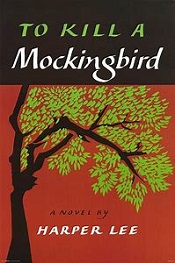In this powerful narrative, we follow Jean Louise “Scout” Finch as she grows up in Maycomb, Alabama alongside her brother, Jem, during the Great Depression. This unconventional six-year-old girl tags along with Jem and their friend, Dill, on their adventures, including trying to draw out the neighborhood ghost, Boo Radley, eating homemade cakes at Miss Maudie’s house and even eventually sneaking into the courthouse to get a peek of their father practicing law. Their widowed father, Atticus Finch, a respected lawyer in their small town, makes the unpopular choice to take a case defending an innocent black man accused of a crime he didn’t commit. From all the attention the trial attracts to the Finches’, Scout faces the reality of racism that is present in her community. Through the trial and the happenings in their town, Atticus teaches his children empathy, as one of his quotes from the book reads, “You never really understand a person until you consider things from his point of view — until you climb into his skin and walk around in it.” The writer, Harper Lee, effortlessly captures the perspective of a child’s introduction and realization of how racism and prejudice play into the lives of those around her. This book carries a heavy yet important story and highlights the leverage that those with power, both institutional and social, hold and how it looks through the rebellious eyes of such a spirited young girl. Holding values that still ring true to this day, this novel has proved time and time again why it has earned its spot as a literary classic, still a staple to many classrooms across the nation. If there is one book you’ve been meaning to get around to, make sure the next one you pick up is To Kill a Mockingbird.
–Christina Chang,
Student Engagement Specialist, 826Michigan
Featured in October 2019 newsletter


